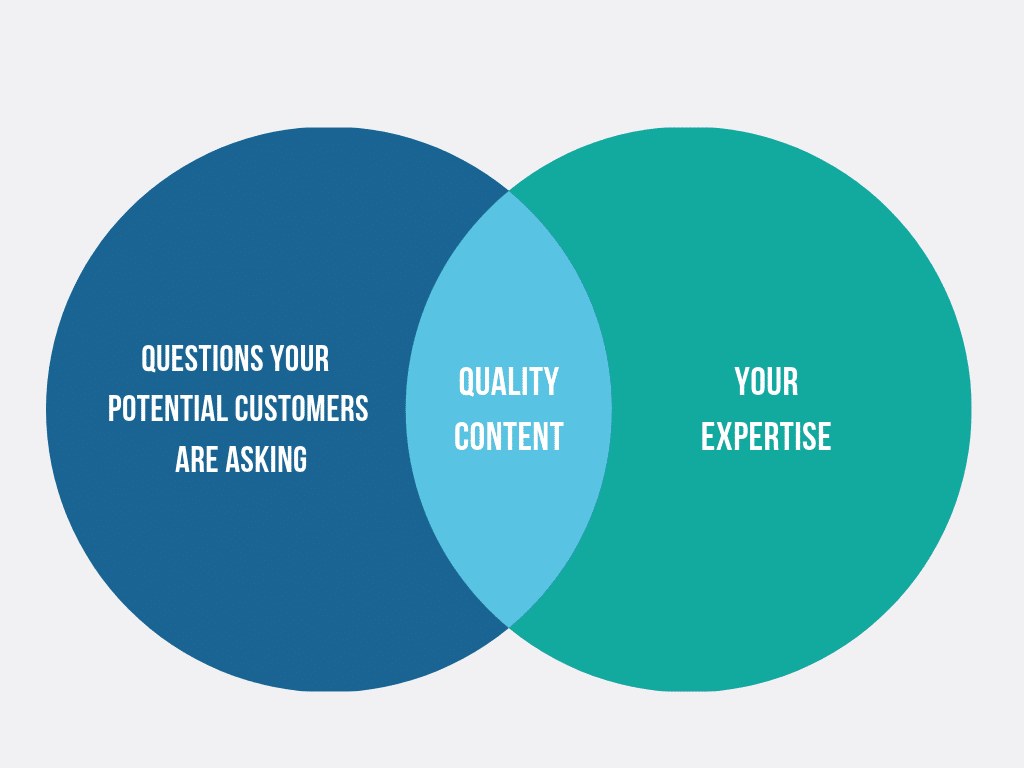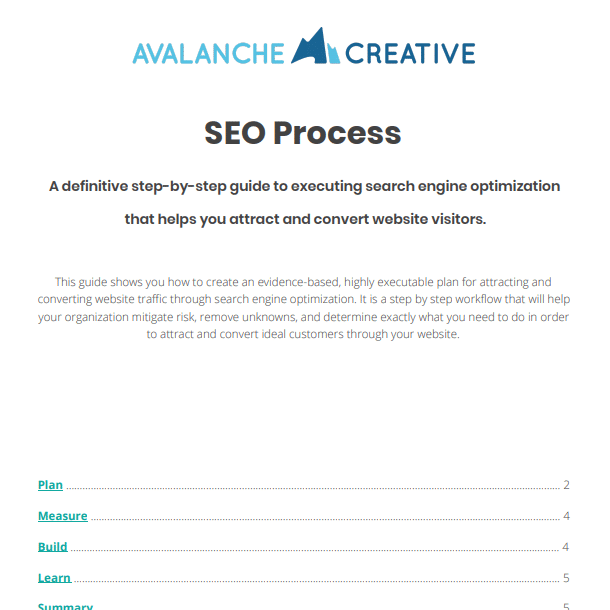How to Combine Local SEO and Content Marketing for Small Business
Category: Content Strategy, Guide, Local SEO | Tags:
This guide contains everything we know about SEO and content marketing for local small businesses. We constantly update this article to help small businesses with their local SEO efforts. For your convenience, we’ve broken this article up into a table of contents.
Table of Contents
An Example of How Local SEO for Small Business Works
If you’re here you probably understand that search engine optimization is crucial for small businesses. But, you need a little extra help getting results through SEO. We want to start this article by establishing ourselves as a credible source with a real example of local SEO at work for a small business.
We are a marketing agency for small businesses. We offer comprehensive local SEO services that can help small businesses dominate their local market and generate leads for new clients.
And now for the example:
The internet has democratized information. People like to independently research information on DIY, hacks, recipes, products, services, and much more. They don’t want to be sold to when they need something – they want to self-educate and find a solution to their problem that is both relevant and trustworthy.
Relevancy & Trust Signals
Search engine optimization is all about being relevant and trustworthy to your potential customer. You do that, by developing search “empathy.” This is where you develop a deep understanding of your customer and experience what they experience as they search for solutions to their problems.
Let’s say you are a local HVAC company that does furnace repair. You obviously want to show up in local search results for “furnace repair.”
We can see that people all across the country search for furnace repair often:
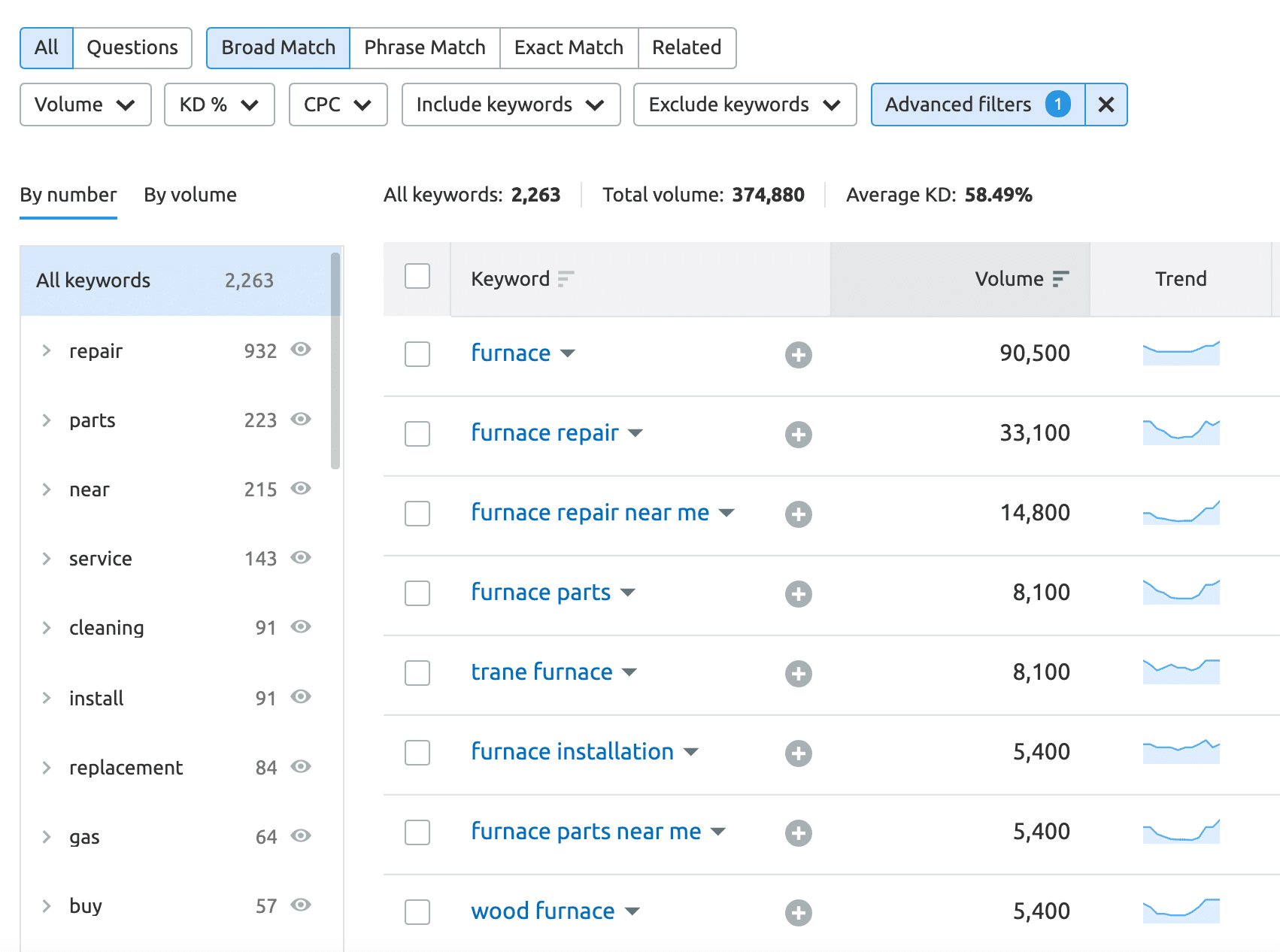
But what is it going to take to get your local small business visible on a local keyword like that? In short – a lot of work. But we’ll look to the SERPs (search engine results page) for a little breakdown and evidence:
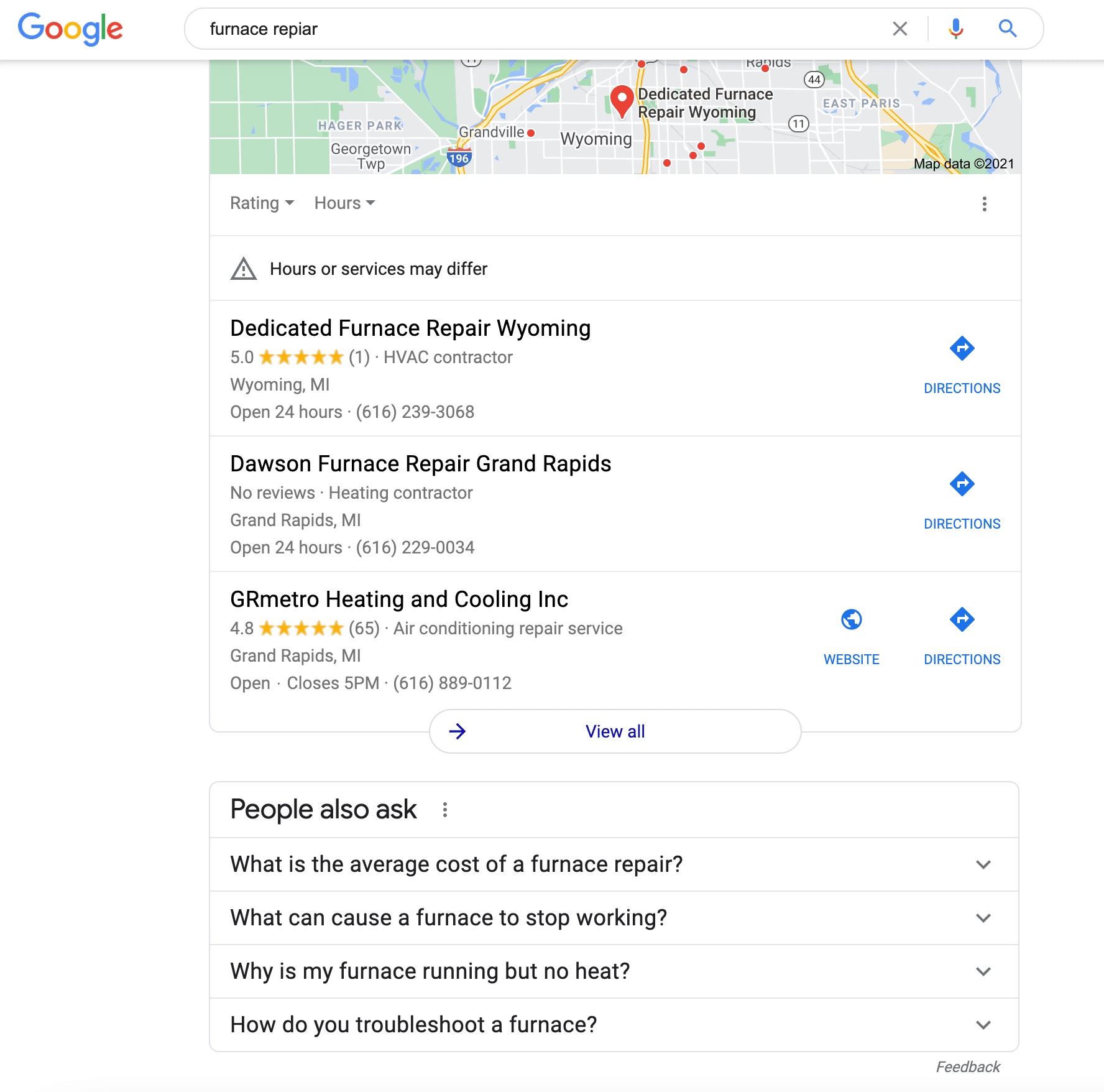
As you can see from the screenshot above, the search engine results page shows 3 businesses in what’s called the “local pack” or the “map pack.” This is a highly sought-after position.
The reason these companies are showing up in the map pack is that Google believes they may offer the most relevant and trusted experience for someone looking for “furnace repair” locally.
When I analyze this local search result page example there are few things that stand out:
- “Furnace Repair” is right in the name of 2 of the companies (relevancy) that show up, even though they don’t have many positive reviews.
- The listings provide a snapshot of availability (2 businesses are open 24 hours a day).
- The “People also ask” SERP feature is showing up, which means Google isn’t quite sure exactly what the searcher needs in regards to furnace repair.
All of this tells me that Google doesn’t have all the context to help this specific searcher with their furnace repair needs.
When anyone searches for something locally, it’s important to remember they are a unique person with unique circumstances and are making, possibly the same query, but have different problems and have researched differently.
If Google doesn’t know what the searcher needs in regards to “furnace repair” they are going to look to websites with the best experience to answer and all questions someone may need in regards to furnace repair.
Search engines always want to recommend a site that will give the searcher what they are looking for, fast.
As a local small business, you’ve got to have more helpful, meaningful content that answers all questions and builds confidence.
Your site needs to be the last stop on the searchers’ journey. You do that by fulfilling their intentions all the way through their search journey. In the case of furnace repair, that even begins when your potential customer is looking for anything related to furnace repair – including solving their own furnace repair issues.
Below you’ll see popular questions people ask search engines about furnace repair.
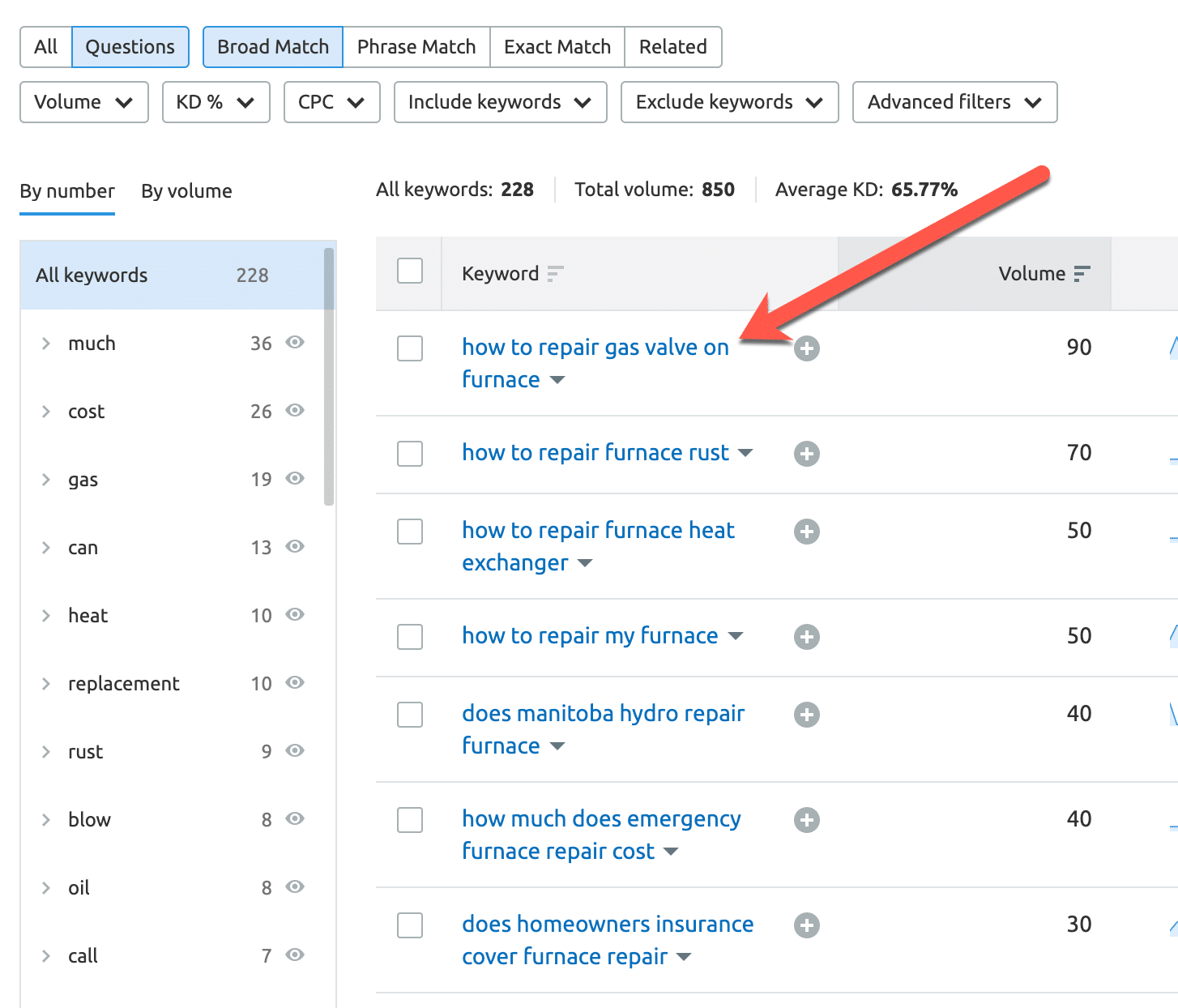
Google looks at the keyword “furnace repair” in the context of all the variations of the way people search for furnace repair. This means, if you want to rank your small business for popular keywords that drive new business, you’ve got to take a deep dive into the keywords and start creating content to fulfill user intent.
What is user intent?
User intent is what a user online intends or wants to find online when they type their search term into an online search engine.
“Furnace repair” is pretty clear. The searcher needs furnace repair. But, contextual facts about the human, have an influence over the personalized results Google recommends to the searcher. Facts like:
- who they are
- where they are
- what device they are searching on
- what they searched before searching “furnace repair”
- other online activities
Why Local SEO for Small Businesses?
Here are the top 6 reasons SEO for local small businesses is crucial:
-
More Qualified Customers
Your website is the salesperson that never sleeps. A website that is visible in Google for the right keywords and offers a valuable experience to visitors will do sales for you. You’ll have customers coming to you ready to buy before you’ve had to convince them to buy.
-
You Own Your Marketing
SEO is the best investment because (when done right) you’re focused on creating a helpful experience for your target audience. It’s like an investment into a house you own vs paid advertising where you don’t own the real estate – you are renting it.
-
Better Conversion Rates
If done right, SEO drives a 14.6% conversion rate. Compare that to traditional strategies like direct mail and print ads that have a 1.7% average conversion rate. (source)
-
Easier Sales
If you are continuously creating helpful content for SEO and actually using it, even outside of SEO, sales will be easier. Your clients will be more educated and have more trust in your business when you have helpful content (better content than your local competition).
-
You Help Your Customers
What’s better than helping your customers BEFORE they’ve made a purchasing decision? Not much. Good SEO helps your customers solve their problems.
-
You Understand Your Customers Better
Good keyword research helps you understand your customer better. When you explore the questions they ask and the content that is available to them online today, you’ll be in a better position to help them and that’s a win-win.
Types of Local Small Businesses That Benefit from SEO
This is certainly not an exhaustive list, but this covers a lot of the industries and categories of small businesses that need SEO.
- Accounting
- Advertising
- AgriculturalServices
- Apartments
- Architects
- Assisted Living
- Attorneys
- AutoRepairShops
- BailBonds
- Bakeries
- Banks
- Bars
- Beauty Salons
- Car Dealers
- CarInsurance
- CarRental
- Carpet Cleaners
- Catering Services
- Chiropractors
- Churches
- Clothing
- CoffeeShops
- Communications
- Computer Services
- Construction
- Contractors
- DaySpas
- Dentists
- Doctors
- Education
- Electricians
- Electronics
- EmploymentAgencies
- Engineering
- Event Planning
- FinancialServices
- FlooringCompanies
- Florists
- Furniture
- Golf Courses
- Grocery Stores
- Hardware
- HomeServices
- Hotels
- Industrial Equipment
- Insurance Agencies
- Internet Services
- Jewelers
- Lawn Services
- Locksmiths
- Medical Services
- Movie Theaters
- Moving Companies
- Nightclubs
- Opticians
- PestControl
- Pet Stores
- Photographers
- Plumbers
- Psychologists
- RealEstateAgencies
- Restaurants
- Roofing Contractors
- Security
- Shopping
- SportingGoodsStores
- Storage
- Travel Agencies
- Veterinarians
- Yoga Studios
Local SEO Strategies and Tactics for Small Businesses
What is Local SEO for Small Businesses?
SEO or search engine optimization for small business is the process of getting quality traffic to your site with the intent of converting that traffic into a new lead or customer. For the most part, the tactics behind SEO for small businesses (in general) aren’t that different than any other industry. For industry-specific SEO guides – visit this page.
On-Page, Off-Page, & Technical SEO
SEO can be broken down into three general categories; on-page SEO, off-page SEO, and technical SEO.
On-page SEO is mainly the content on your page. Keywords, titles, headings, meta descriptions are all SEO signals that are on a page of your website. Search engines want to make sure the content is relevant to the search term or keyword. Relevancy plays a big role in on-page SEO for therapists.
Off-page SEO is everything from other web pages that help a particular page on your site rank. There are several factors, but the biggest are backlinks or links from other sites to your site. It’s crucial to have a good volume and good quality or relevant backlinks to validate your trust and authority.
Technical SEO is, for the most part, all under the hood of your website. It’s making sure your website is developed so that it is crawler friendly, has an SSL certificate, loads fast, etc.
Meta Titles and Descriptions
Meta titles or page titles are the titles of each individual page or post on your website. These are not necessarily visible on the page, but they are visible to the search engines. You have control over this title and what it says so it is crucial that you optimize these titles to stand out.
Meta titles are one of the most overlooked, but powerful SEO tactics small businesses have to rank higher. Look at the title below from a furnace repair company. We searched for “furnace repair,” which is a keyword Google believes has local intent (results on the page are mostly for local businesses) and this was on the top of page one:
The area in red is your meta or page title. This you have control of. The company above has done a good job optimizing this title for the keyword we searched because it includes
- The city we are located in.
- The keyword “furnace repair.”
- The name of the company last (which is a much better tactic).
Keep in mind that there are limits to how many characters you can put in a title before it shows an ellipses (the “…”). Google currently goes by the pixel width of the title. Make sure to keep in mind what works best for your desktop and mobile searches.
Meta descriptions or page descriptions are another HTML attribute that provides a summary of a page or post’s content. These can also be optimized for the search engine results page, but Google will often manipulate them for certain search terms.

The page description is in red, above.
Keyword Research
No matter the industry, an effective SEO strategy hinges on really good keyword research and then careful content planning.
It’s important to know exactly what your audience is searching for all the way through their buying journey. It helps to understand that a lot of people do independent research on the products or services you offer before they start making searches that indicate they are ready to find a local small business to work with.
We always start by building a big list of keywords and look at the national keyword volume. By looking at how people search for any small business nationally we can determine the best keywords to focus on locally.
Below is a screenshot of some of our keywords for a local dentist using SEMRush:
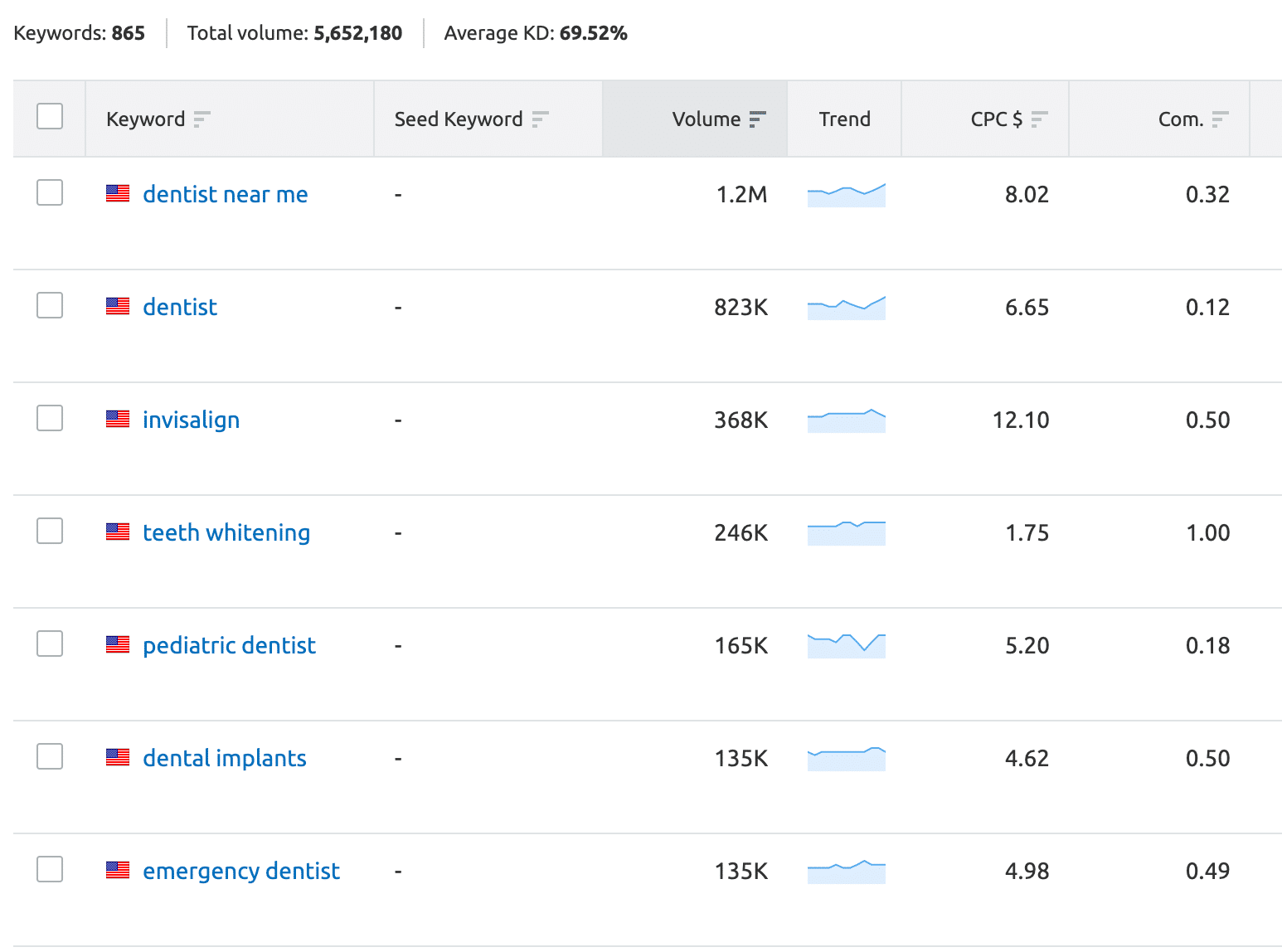
Keyword research is both an art and science of looking at how people search and how often they search for it.
Good keyword research also involves investigating what the intent of the user is for each keyword. People can use the exact same words, but be looking for something different. Understanding possible intent and considering context helps us you determine what you need to include on your site to rank highly for each keyword.
To perform local small business keyword research we use the Keyword Magic Tool in SEMRush. This allows us to start with a broad term like “furnace repair” to start gathering all the relevant ways people search for furnace-related services.
How To Do Keyword Research for Your Local Small Business
- Service by service, or product by product, enter your service/product name in a keyword research tool.
- Add keywords any and all relevant keywords (even if they are just questions or somewhat related to what you offer).
- Use filters to find keywords that show in the local pack (your Google My Business listing in the search engine results).
- Once you’re done, start organizing keywords by your services.
- Use keywords to make sure you are creating really helpful landing pages about each one of your services.
Page Load and Mobile-friendliness
Your page load time is crucial not only to SEO but your potential customer’s experience. Google will promote sites with a faster page load speed if it enhances the user’s experience. This is especially important when loading over mobile devices, which are often being used on 3G and 4G connections with slower download speed.
Keep the size of your images and other large media minimal and work with an experienced web developer to optimize your site for speed.
Learn more about page load speed.
Your website needs to be mobile-friendly. Your target audience is searching for you on mobile devices and with Google’s mobile-first indexing, you can’t ignore the importance of a mobile-friendly website. Mobile-first indexing is essentially Google stating that they are prioritizing mobile-friendly sites when people search on their mobile devices.
Web Design
Your website design is important to the user’s experience. Good local SEO and a quality website experience go hand-in-hand.
If your potential customers can’t easily find what they are looking for, you may miss out on sales. It’s important to consider internally linking between pages to add context and help the user navigate. This also tells Google and other search engines what pages are important and how pages might relate to one another.
When it comes to web design for local small businesses, you should make sure that your website includes the following and is very easy to find:
- Your address and phone number.
- A clear and consistent call to action.
- Reviews from people that you have worked with.
- A list of service areas and a link or embed of Google Maps to make it easier to find you.
- Blog posts that are educational and related to the services you offer.
- A contact form with clear instructions on what happens when people fill it out.
- Pricing information, or at least an idea of what your product/service costs.
Link Building
Link building is the process of acquiring backlinks or links from other sites to your website. This is really important for local businesses to build your expertise, authoritativeness, and trust locally.
Moz has a list of local citation websites broken up by categories. These are websites that will typically list your business for free. Although your customers may not find you often on these sites, it’s great to have your business listed there for credibility.
Social Media
Utilizing your social media channels, you should be promoting the content you publish on your website. If you have identified demand for the content you are investing in, it can be beneficial to share it and stay relevant and top of mind with your target audience.
We recommend sharing snippets and links to a mix of articles that you write on your own site and that others write that your audience would benefit from. Don’t share content that is self-promotional. Share content that is helpful to your ideal customer.
Local SEO
If you are a local small business it’s crucial to apply local SEO tactics. Local SEO helps you optimize your site for a local audience. If your target audience is physically close to your company’s location or within your service area, it’s important to add some additional tactics to your SEO strategy.
There is a lot to cover with local SEO for small businesses.
- Create a Google My Business listing.
With this free account, you can optimize it by adding the types of products or services you offer and making sure all your business information is complete. Make sure you fill out absolutely everything and regularly utilize it by making posts and adding photos and videos. Also, make sure to respond to reviews that your customers leave you. Your Google My Business listing is what shows up in the local pack. - Mention the areas you serve on your website and possibly even create a web page for each location.
Create a “service-area” page and then list all the surrounding cities you serve. This helps add context to the search engines so they know who to help when they search “near me” or one of the cities you serve. You are going to show up for more organic results if you have service-specific and city-specific landing pages. For example, a “Grand Rapids Furnace Repair” page. If someone in Grand Rapids is looking for furnace repair, and if this particular page has great content, then it should be the most relevant page available to the searcher. - Make sure you are listed on other local citations like your local Chamber or other friendly counseling services.
Use a list like the Moz citation list to get started. Whatever your industry is, you likely are familiar with the popular listing sites (Yelp, Angie’s List, HomeAdvisor, etc). Get as many links back to your site as possible and make sure that information like your name, address, and phone number are consistent. This builds trust and is certainly one of the many ranking factors.
Content Marketing for Small Businesses
Why do we bring up content marketing on a guide about local SEO? Because an effective SEO strategy for small businesses is co-dependent on content. SEO and content go together like peanut butter and jelly.
The beginning of any effective content marketing strategy for therapists begins on a foundation of a thorough keyword research process, which is also the foundation of great SEO.
Content is anything your target audience interacts with on your website or Google My Business listing. Content is not just the words (although those are crucial), but the images, videos, audio, and other media on your site. Google’s crawlers understand different types of media and use that to build context and understand your site. The better they understand your site, the easier it is for them to determine whether or not it is truted, valuable, and will fulfill the intention of the searcher.
How to Identify Content Marketing Ideas
Talk to Your Customer
Talk and then listen, really. While I’m sure you understand your products or services really well, that’s most likely not true of your customer. You talk with them every day and likely answer their questions. Turn those questions into helpful content on your website.
Every customer is unique. You never know when they’ll want to spend a lot of time understanding the details of your product or service. That’s why it’s important to have a lot of helpful information on your website.
Consider the Venn diagram below:
Your goal is to identify quality content that is attractive to your ideal customer(s) that you could create.
The pain, problems, or questions your potential or even current clients are asking should inform your content strategy.
Keyword research helps you get an idea of what your customers would care to know. But it should also come from the interactions you have with them.
Do Keyword Research
If you’ve read this guide, you’re probably starting to think I’m sounding like a broken record.
I can’t emphasize enough the importance of keyword research enough. The reality is that keyword research is never done. You should always be doing it to determine what kind of content would be valuable to your target audience.
By focusing on writing quality content on all the questions, topics, and subtopics people search for, you’ll begin to dominate the search engines.
Create a Shortlist
As you use your keyword research tool, add keywords to a shortlist. These can be high-intent, low-intent, short-tail, and long-tail. Add any that seem relevant for now. You can chisel them down later. The point of creating a big list is to get a good overview of your entire potential market and you can create a content plan based on all of your keywords.
Our SEO Services: Websites That Increase Traffic & Conversions
We create websites and do local SEO for small businesses that want to turn their website into a lead-generating machine.
Attracting website traffic can be a challenging and daunting task. There are a lot of moving parts to your website. It’s a living organism that requires constant attention and maintenance. And then you have to think about quality, fresh content that you can contribute. Writing great, authoritative content takes time.
Evidence-based Local SEO
At Avalanche Creative, we create evidence-based, highly executable search engine and content marketing plans for small businesses. Our process takes the mystery out of the question, “should I invest long term in SEO and content marketing?” and provides a bullet-proof plan for how to execute therapist SEO and content strategy that drives more traffic, more qualified leads, and builds your brands authority.
We are an SEO company that specializes in SEO for local small businesses. Our SEO services mitigate the risk of a bad investment in search engine optimization. We do this by researching and planning more thoroughly than anyone else. We make sure your SEO and content marketing plan is truly investable.
Types of Small Business We Can Help
- Accounting
- Advertising
- AgriculturalServices
- Apartments
- Architects
- Assisted Living
- Attorneys
- AutoRepairShops
- BailBonds
- Bakeries
- Banks
- Bars
- Beauty Salons
- Car Dealers
- CarInsurance
- CarRental
- Carpet Cleaners
- Catering Services
- Chiropractors
- Churches
- Clothing
- CoffeeShops
- Communications
- Computer Services
- Construction
- Contractors
- DaySpas
- Dentists
- Doctors
- Education
- Electricians
- Electronics
- EmploymentAgencies
- Engineering
- Event Planning
- FinancialServices
- FlooringCompanies
- Florists
- Furniture
- Golf Courses
- Grocery Stores
- Hardware
- HomeServices
- Hotels
- Industrial Equipment
- Insurance Agencies
- Internet Services
- Jewelers
- Lawn Services
- Locksmiths
- Medical Services
- Movie Theaters
- Moving Companies
- Nightclubs
- Opticians
- PestControl
- Pet Stores
- Photographers
- Plumbers
- Psychologists
- RealEstateAgencies
- Restaurants
- Roofing Contractors
- Security
- Shopping
- SportingGoodsStores
- Storage
- Travel Agencies
- Veterinarians
- Yoga Studios
Reach Out to Us Today
Interested in our services? We love chatting with fellow small businesses about how we can upgrade their website into a lead-generating machine. Send us a message today.
Frequently Asked Questions
Why is local SEO important to your business?
Over 50% of all website traffic comes from organic search. Without local SEO your business will miss opportunities to sell your products or services to new customers.
Why does local SEO matter?
Local SEO matters because it allows people to use search engines to discover local businesses that can fulfill their product or service needs.
How does local SEO help your business?
Local SEO can reduce your customer acquisition costs by connecting you to customers looking for what your business offers. It provides your brand with free, organic visibility online.
Share this article:
The Avalanche Email: Fun. Simple. Educational. No Selling.
Learn Result-focused SEO & Content
Join over 2,272+ others who get one email every Wednesday with simple instructions on how to get more website traffic and leads through SEO and content marketing. (Learn more about the email)
???? Learn SEO in 30-Minutes????
Grow Your Business Through SEO ????

Schedule a call and we’ll show you:
- What to do to get more visibility.
- How your competitors are doing.
- What we can do to help.
Related Resources

Download our SEO Process.
Keep Learning
Creating the Perfect SEO Content Template in Google Docs
Learn how to create an SEO Content Templates in Google Docs to help drive new traffic to your website from the search engines. SEO Content Templates provide specific recommendations and directives for creating new content on your website with the purpose of improving your SEO.
How To Show Up in Gemini (And Win More Local Jobs)
Show up in Gemini when homeowners search for landscaping services. Build the right signals on Google and your website to win more qualified local jobs.
How to Run Google Ads for Landscapers: A Complete Guide
Learn how to set up Google Ads for landscapers, attract qualified leads, and win more local jobs with this step-by-step guide.
🏔️ Watering > Planting New Seeds
Your next marketing win may already be on your site. Learn how to optimize existing pages for better rankings, traffic, and results.
The Recipe vs. The Meal
Your customers buy the experience, not the product. Discover a simple way to shift your message from ingredients to the full meal.
What’s the Best CMS for Landscaping Businesses?
Compare the best website platforms for landscapers. Learn the pros and cons of Wix, Squarespace, and WordPress, and why WordPress is best for long-term SEO.


